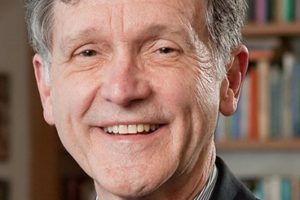Learning dissent is never easy. One person’s prophet is another’s anti-Christ. One person’s conscience is another’s bigotry. Sometimes dissent can get you damned. Sometimes (like now?) silence can too.
Without an ark: The people in the Noah story weren’t ready for earth’s devastation. Neither are we.
Twenty-first century humanity is eating, drinking, marrying and unmarrying, driving, flying, breathing and buying while planet earth decomposes before our very eyes. The fate that befell Noah’s generation seems headed right at us. This time, however, there’s no ark. It is a planetary crisis from which no one can escape.
Not instruction, but provocation: listening to the ‘taught’
Across four decades, listening to students (“those who are taught”) has provoked me to action and insight I might otherwise have dodged. When students have moved classes from instruction to provocation, I’ve not only been awakened, I’ve often been reborn.
Birthrights and Bibles: ‘evangelicals’ at the White House
President Trump’s dinner with “evangelical” ministers is a reminder that American Christians have every right to support the politicians and policies that their consciences may dictate. But none of us can claim to have it both ways – dictating moral constraints to the masses while excusing them in governmental officials for political purposes.
Converting our hearts: sexual abuse and the church’s hesitant penance
Ongoing revelations regarding sexual abuse in the Christian Church mean that we’d all better prepare our hearts – spiritually, individually and communally – with the courage of conscience to live and act in a Church and a country that is losing its bearings.
Fundamentalism has (almost) won: Now what?
While responding to fundamentalism is exhausting, it is essential to question its immediate impact on American church/state, particularly since fundamentalist ideology seems to have become the default interpretation many American Christians implicitly or explicitly bring to bear on questions of scripture, doctrine, church and society.
The jeremiad: good news of an unprivileged gospel
My longtime friend and mentor Samuel Hill affirmed “evangelical Christianity” for its emphasis “on righteousness, love of neighbor, disciplined behavior, and a sensitive conscience.” Restoring those now-diminished gospel traits will require strong doses of “moral chemotherapy,” beyond culture privilege. It’s worth the treatment.
Doing church in America: ‘resetting a Body of broken bones’
In American Christianity the broken bones of individual and collective division desperately need resetting.
On the border: ‘Children of a lesser god’
If Christians in America cannot raise our collective voices against our government’s treatment of these “little ones,” then we’re the ones who serve a “lesser god.”


